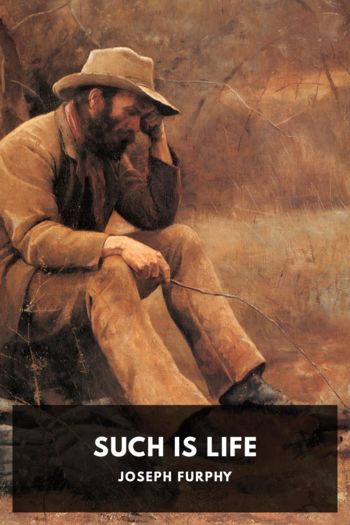Such Is Life, Joseph Furphy [online e book reading txt] 📗

- Author: Joseph Furphy
Book online «Such Is Life, Joseph Furphy [online e book reading txt] 📗». Author Joseph Furphy
Yet do I cling (continued the pipe) to Plato’s beautiful thought, that no soul misses truth willingly. In bare justice to brave, misguided Humanity; in daily touch with beings in so many respects little lower than the imagined angels; in dispassionate survey of history’s lurid record of distorted loyalty staining our old, sad earth with lifeblood of opposing loyalty, while each side fights for an idea; in view of the zeal which fires the martyr-spirit to endure all that equal zeal can inflict; in contemplation of the ever-raging enmity between the seed of the woman and the seed of the serpent, the Ormuzd and the Ahriman in man; in view even of that dismal experiment indifferently termed “making the best of both worlds,” and “serving God and Mammon”—in view of all these things, I cannot think it is anything worse than a locally-seated and curable ignorance which makes men eager to subvert a human equality, self-evident as human variety, and impregnable as any mathematical axiom. And this special brand of ignorance is even more rampant amongst those educated asses who can read Kikero in the original than amongst uneducated asses who know not the law, and are cursed.
Remember (pursued the pipe, with a touch of severity) that Science apprehends no decimal of a second adequate to note, on the limitless circle of Time, the briefness of a centenarian’s life; and yet the giddiest pitch of human effrontery dares not carry beyond the incident of death any vestige of a social code now accepted as good enough to initiate a development which, according to your own showing, goes on through changing cycles till some transcendent purpose is fulfilled. The “love of equality”—that meanest and falsest of equivocations—sickens and dies, and the inflated lie of a social privilege based on extraneous conditions collapses, under the strict arrest of the fell sergeant, Death. If we seek absolute truth—which can never be out of place—surely we shall find it beyond the gates which falsehood cannot pass. And here we find it conceded by all; for as material things fade away, human vision clears, and truth becomes a unit.
Osiris’ balances weighed impartially the souls of Coptic lord and slave, before the pyramids rose on Egypt’s plains; austere Minos meted even justice to citizen and helot, while the sculptured ideals of Attica slept in Pentelican quarries; Brahmin and Sudra, according to deeds done in the body—strictly according to deeds done in some body—awake beyond the grave to share aeons of sorrowful transmigration, and final repose; Nirvana awaits the Buddhist high and low alike; Islamism sternly sends all mankind across the sharp-edged Bridge, which the righteous only cross in safety, while wicked caliph and wicked slave together reel into the abyss below. The apotheosis of pagan heroes rested on personal merit alone. No eschatology but that of High Calvinism anticipates, in the unseen world, anything resembling the injustice of a civilisation which, of set purpose, excludes from the only redemption flesh and blood can inherit, that sad rearguard whose besetting sin is poverty. Yet John Knox’s wildest travesty of eternal justice never rivalled in flagrancy the moving principle of a civilisation which exists merely to build on extrinsic bases an impracticable barrier between class and class: on one side, the redemption of life, education, refinement, leisure, comfort; on the other side, want, toil, anxiety, and an open path to the Gehenna of ignorance, baseness, and brutality. Holy Willie’s God, at least, heaps no beatitude on successful greed; and your Christian civilisation does so. Dare you deny it?
Chastened by contemplation of levelling mortality, awed into truth by the spectacle of a whole world made kin by that icy touch of nature, the belated soul seeks refuge in a final justice which excludes from natural heirship to the external home not one of earth’s weary myriads. Your conception of heavenly justice is found in the concession of equal spiritual birthright, based on the broad charter of common humanity, and forfeitable only by individual worthlessness or deliberate refusal. Why is your idea of earthly justice so widely different—since the principle of justice must be absolute and immutable? Yet while the Church teaches you to pray, “Thy will be done on earth, as it is done in heaven,” she tacitly countenances widening disparity in condition, and openly sanctions that fearful abuse which dooms the poor man’s unborn children to the mundane perdition of poverty’s thousand penalties. Is God’s will so done in heaven? While the Church teaches you to pray, “Thy Kingdom come,” she strikes with mercenary venom at the first principle of that kingdom, namely, elementary equality in citizen privilege. Better silence than falsehood; better no religion at all—if such lack be possible—than one which concedes equal rights beyond the grave, and denies them here.
I wish you to face the truth frankly (continued the pipe), for, heaven knows, it faces you frankly enough. Ecclesiastical Christianity vies with the effete Judaism of olden time as a failure of the first magnitude. Passing over what was purely local and contemporaneous, there is not one count in the long impeachment of that doomed Eastern city but may be repeated, with sickening exactitude, and added emphasis, over any pseudo-Christian community now festering on earth. Chorasin and Bethsaida have no lack of antitypes amongst you. Again has man overruled his





Comments (0)